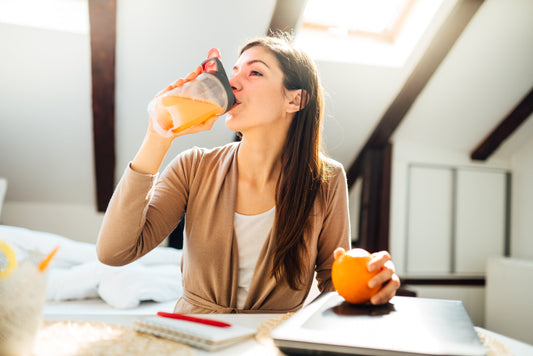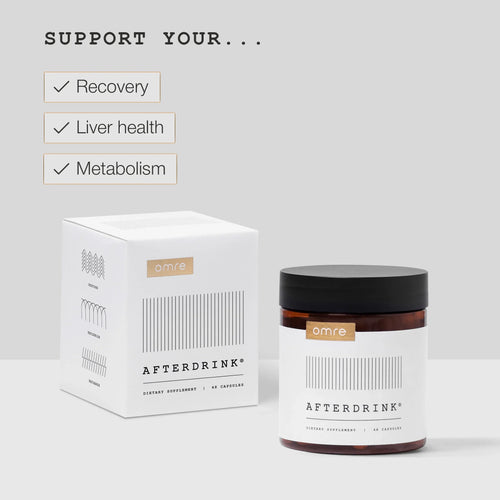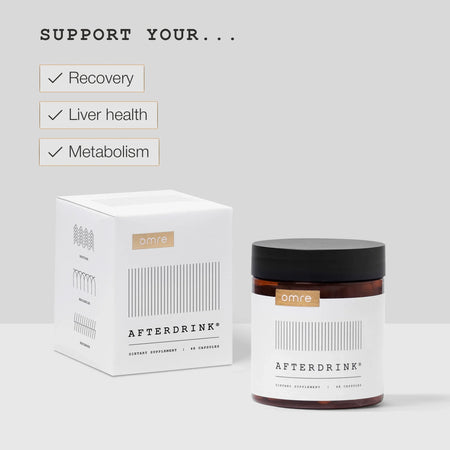Table of Contents
- CAUSES OF A HANGOVER
- WHAT'S IN PEDIALYTE?
- PEDIALYTE VS. OTHER HYDRATION SOLUTIONS
- IS PEDIALYTE GOOD FOR HANGOVERS?
- SHOULD YOU DRINK PEDIALYTE BEFORE OR AFTER DRINKING?
- HOW MUCH PEDIALYTE SHOULD YOU DRINK FOR HANGOVERS?
- IS PEDIALYTE A HANGOVER CURE?
- ARE THERE ANY NEGATIVES?
- PEDIALYTE FOR HANGOVERS – FINAL VERDICT
Is Pedialyte good for hangovers? It's a common question as many people are using this rehydration drink to recover after drinking.
Pedialyte was initially designed as a drink to rehydrate unwell children. Nowadays, it's widely marketed as a drink for all ages and causes dehydration, even as a rehydration drink for sports stars and athletes.
But is Pedialyte also good for hangovers?
Given that dehydration is one of the leading causes of hangovers, it's only natural to assume that it could help.
This article will examine Pedialyte's ingredients before answering whether it suits a hangover.
AFTERDRINK®
A supercharged antioxidant designed to support recovery, made from the very best, research-backed ingredients on the market.*
CAUSES OF A HANGOVER
Before we get into whether Pedialyte is good for hangovers, we first need to review the causes of a hangover. After all, without knowing the reasons why drinking alcohol leaves you feeling rough, it'll be hard to tell what works.
Ultimately, hangovers are caused by drinking too much alcohol for your body to handle. Your liver metabolizes alcohol at a specific rate. Typically, that's around one drink per hour for the "average" person. However, the rate varies greatly depending on factors such as your weight, gender, and age, to mention a few. You can read more about this in our article about how long alcohol stays in your system.
When you drink faster than the rate at which your liver can break down alcohol, levels start to rise in your bloodstream. And this is where the problems start:
DEHYDRATION
One of the leading causes of a hangover is dehydration. Alcohol is a diuretic, which means it makes your kidneys flush out water. It does so by blocking the release of a hormone called vasopressin. As a result, drinking over several hours can lead to dehydration.
INFLAMMATION
While dehydration plays a big part, it isn't the only cause. When alcohol is metabolized, toxic by-products are formed. Examples include acetaldehyde, a highly reactive molecule that damages the cells it comes into contact with. (1)
In normal circumstances, your body breaks down acetaldehyde quickly before it causes damage. In addition, antioxidants help by neutralizing harmful by-products. However, during periods of overindulgence, this system is overrun. Hence, inflammation is another major cause of hangovers.
SLEEP QUALITY
Alcohol massively reduces the quality of your sleep. It blocks your brain from entering the deep stages of sleep, which is required to feel fully rested. This stage is also known as rapid eye movement (REM). Therefore, reduced sleep quality plays a large part in the severity of hangovers. (2)
In summary, the science of hangovers is complicated. They are caused by a combination of the factors mentioned above.
With the science out of the way, let's look at what Pedialyte is made of to see if anything can help with hangovers.
WHAT'S IN PEDIALYTE?
There are many different formulations of Pedialyte available, but the classic version contains:
- water
- dextrose (a form of sugar)
- zinc
- electrolytes: sodium, chloride, and potassium
It's water with added electrolytes, a small amount of sugar, and zinc.
PEDIALYTE VS. OTHER HYDRATION SOLUTIONS
People often compare Pedialyte to other hydration options like Gatorade and coconut water. Still, Pedialyte contains more electrolytes and less sugar than Gatorade, making it some people's preferred choice. While rich in electrolytes, coconut water is less effective than water for hangover relief.
IS PEDIALYTE GOOD FOR HANGOVERS?
Pedialyte can be helpful for hangovers as it promotes rapid hydration with its sugar and electrolyte content. While it doesn't directly reduce all hangover symptoms, it’s an easy-to-drink alternative to plain water.
At present, no studies specifically examine Pedialyte as a hangover remedy. The National Institute on Alcohol Abuse and Alcoholism (NIAAA) notes that electrolyte imbalance isn’t a primary cause of hangovers, so replenishing electrolytes alone may not address symptoms like headaches or nausea.
That said, Pedialyte’s ability to hydrate and boost energy makes it a good option for managing dehydration, a key factor in hangovers. Its taste and composition often make it more appealing when feeling unwell compared to plain water.
While it’s not a complete solution, combining Pedialyte with rest and light meals can aid recovery.
SHOULD YOU DRINK PEDIALYTE BEFORE OR AFTER DRINKING?
It’s best to drink Pedialyte both before and after drinking alcohol. Drinking it before can help reduce dehydration, while sipping it after helps replenish lost fluids and electrolytes, potentially easing hangover symptoms.
DOES DRINKING PEDIALYTE PREVENT HANGOVERS?
No, drinking Pedialyte does not prevent hangovers. While it can help reduce the severity of symptoms like dehydration, it does not address other causes of hangovers, such as inflammation, acetaldehyde buildup, or poor sleep.
AFTERDRINK®
A supercharged antioxidant designed to support recovery, made from the very best, research-backed ingredients on the market.*
HOW MUCH PEDIALYTE SHOULD YOU DRINK FOR HANGOVERS?
To help with a hangover, sip on up to 1 liter of Pedialyte over a couple of hours. Drinking a small amount may not make a noticeable difference, while consuming too much in a short period may be unnecessary.
IS PEDIALYTE A HANGOVER CURE?
No, Pedialyte is not a hangover cure. It helps with hydration and electrolyte imbalance but does not address other hangover symptoms like nausea, headaches, or disrupted sleep. Drinking Pedialyte can support recovery, but hangovers require time to resolve.
ARE THERE ANY NEGATIVES?
Fortunately, drinking Pedialyte—water with minerals and electrolytes—is unlikely to have any side effects.
That said, it is best to avoid gulping liters of it down. The same can be said about anything, even plain water.
ANYTHING ELSE TO CONSIDER?
Hangovers are a sign from your body that you've had too much for your liver to handle. Trying to "cure" or "prevent" hangovers with Pedialyte is not the best approach.
The most critical steps are drinking less alcohol at a slower pace and eating before going. Another good tip is to drink a glass of water between each alcoholic beverage.
In addition, darker-colored drinks are known to cause more severe hangovers. That's because they contain more congeners, which, like acetaldehyde, react with your cells. Sticking to lighter-colored drinks may also help. You can read more about this in our article about congeners.
With that said, if you drink enough of any alcoholic drink, dark or light-colored, you'll wake up with a bad hangover.
PEDIALYTE FOR HANGOVERS – FINAL VERDICT
That brings us to the end of our look at Pedialyte for hangovers.
It's a great drink that supports efficient rehydration with added minerals and electrolytes.
Whether it helps with hangovers is unclear because it has not been researched. But the likelihood is that it's probably an excellent drink to have at the end of your night to counteract some of the dehydration caused by alcohol.
Unfortunately, it does not prevent or cure a hangover, so the usual precautions still need to be taken.
If you're interested in this topic, check out our article about the best drinks for a hangover.





